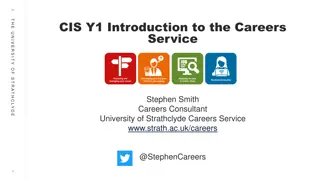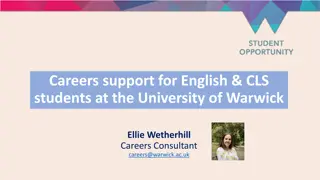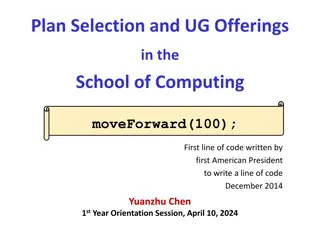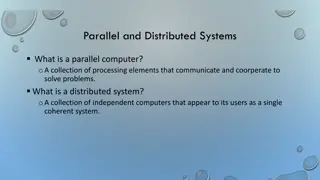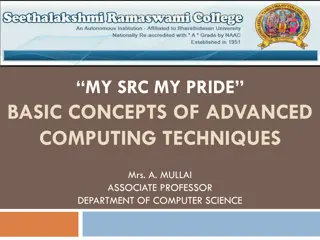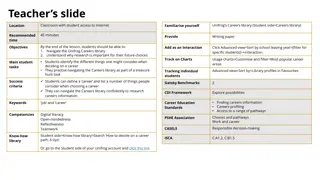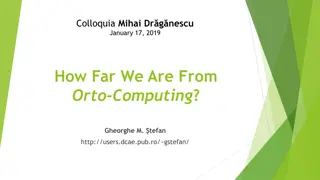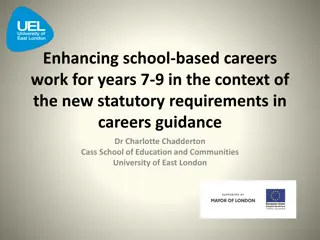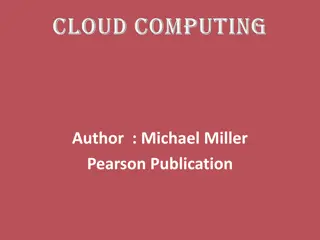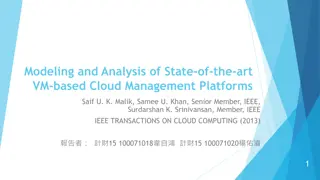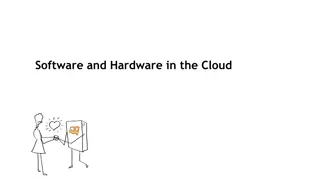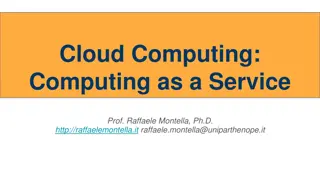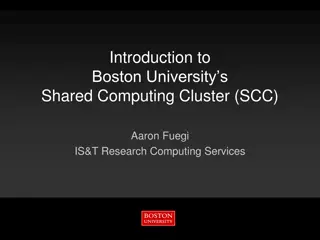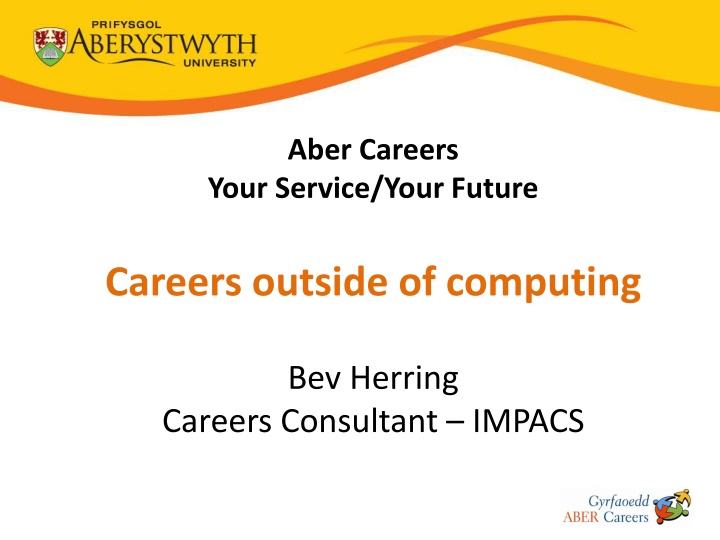
Diverse Career Paths for Computer Science Graduates
Explore the vast array of career opportunities available for computer science graduates outside of traditional computing roles. From teaching to banking, manufacturing, and more, learn about the sectors that employ IT graduates, the skills employers seek, and the different roles you could secure with a computer science degree.
Download Presentation

Please find below an Image/Link to download the presentation.
The content on the website is provided AS IS for your information and personal use only. It may not be sold, licensed, or shared on other websites without obtaining consent from the author. If you encounter any issues during the download, it is possible that the publisher has removed the file from their server.
You are allowed to download the files provided on this website for personal or commercial use, subject to the condition that they are used lawfully. All files are the property of their respective owners.
The content on the website is provided AS IS for your information and personal use only. It may not be sold, licensed, or shared on other websites without obtaining consent from the author.
E N D
Presentation Transcript
Aber Careers Your Service/Your Future Careers outside of computing Bev Herring Careers Consultant IMPACS
Todays focus Sectors that employ IT graduates Various roles you may not have considered Research tools Focus on teaching
Who might employ computer science graduates?
Industry Facts 1.5 million people work in IT & telecoms in the UK 1 in 20 of the entire workforce 59% in IT/telecoms specific industry 41% in IT roles in other sectors (i.e. retail/banking etc.) 38% ICT management or IT strategy/planning roles (rising!) 45% located in London or South East Technology insights
Skills employers need Employers seek graduates with a genuine interest in IT. Candidates are often expected to have: problem solving and analytical skills; communication skills; teamwork skills; project management skills; commercial awareness; creativity; innovation; a willingness to update skills and keep up with technological advances. For some roles, employers search for knowledge of specific programming languages and operating systems.
IT roles in non technical companies Banking, Finance & Accountancy Energy & Utilities Engineering Management Consulting & Business Manufacturing & Production Media Public Sector & Defence Science Teaching & Education Transport & Logistics Retail Higher education - http://www.jobs.ac.uk/
Different roles you could secure with your computer science degree Aeronautical Engineer Air Traffic Controller Archaeologist Armed Forces Technical Officer Automotive Engineer Banker Broadcast Engineer Cartographer Chartered Certified Accountant Communications Engineer Corporate Treasurer Energy Engineer Film/Video Editor Financial Risk Analyst Geographical Information Systems Officer Geophysical Data Processor Graphic Designer Hydrographic Surveyor Information System Manager Insurance Risk Surveyor IT Sales Professional Logistics & Distribution Manager Manufacturing Systems Engineer Oceanographer Operational Researcher Patent Examiner Project Manager Project Support Officer Secondary School Teacher Technical Author Technical Sales Engineer Telecommunications Engineer Telecommunications Researcher
There are non tech roles in Tech companies Operations Sales Marketing Communications Finance Strategy HR http://www.prospects.ac.uk/information_technology_sector_overview.htm https://en.wikipedia.org/wiki/List_of_the_largest_information_technology_comp anies Business directory
Generic graduate schemes Long term employment contracts Many open to all graduates Find your footing in different areas without having to choose a specialty too early on. http://www.graduate-jobs.com/graduate-schemes/ http://www.prospects.ac.uk/graduate_job_search.ht m Graduate schemes by sector
Postgraduate study Not always essential but could give you an edge Will allow you to specialise Necessary for an academic/research career Search PG courses here http://www.findamasters.com/ http://www.findaphd.com/ Or consider a conversion course i.e. Law (GDL) http://jobs.thelawyer.com/jobs/information-technology/ PGCE PGCE (Post 16)
Lets start with the incentives Eligibility Physics Maths Chemistry /Computing Languages Biology English, history, music, RE Geography D&T Primary Primary maths specialis m Scholarship* 30000 25000 25000 - - - - - - 1st or PhD 30000 25000 25000 25000 20000 9000 15000 12000 3000 6000 2:1 or Masters 25000 25000 20000 25000 15000 4000 15000 9000 3000 6000 2:2 25000 25000 20000 20000 15000 0 15000 0 0 6000 Other** 9000 9000 0 0 0 0 0 0 0 3000 https://www.ucas.com/ucas/teacher-training/finance-and-support
A little knowledge goes a long way! Know the sector Teaching and education sector insight Know the role requirements Secondary school teacher
What route? (via UCAS system) University-based Postgraduate or Professional Certificate in Education (PGCE) University based for 1 year. 24 weeks on placement in at least two schools. Placements are arranged by the HEI with their partner schools. School-centred initial teacher training (SCITT) (England only) School Direct (England only) More about school led training (be aware they often look for 3 years previous experience)
What route? (via direct applications) Teach First this programme is for high quality graduates with leadership potential to become inspirational leaders in low income communities. Following six weeks intensive training, you'll teach in a school for two years while working towards a PGCE. Graduate Teacher Programme (GTP) in Wales this gives you the chance to qualify as a teacher 'on the job'. You'll work as an unqualified teacher in a school while you train. Your programme will be individually designed to help you achieve QTS.
Researchers in schools Teacher training and professional development programme exclusive to researchers who have completed a doctorate Train as a teacher, while retaining an academic profile. Year 1 19,000 funding and 11,000 shortage uplift = 30,000 rising to 36,600 Year 2 (more for London fringe) One day a week to pursue own research 1000 budget to support attending conferences etc. 10 weeks a year holiday
Get experienced! Get some experience in the classroom for the age range you are interested in teaching - contact schools in your area to observe lessons. You may want to consider our Penglais School work experience 3 days (January 2016) or School Experience Programme Build your experience with young people in general Recognise the knowledge, experience and skills you have already!
Requirements A degree (subject specific for secondary) GCSE English and Maths at grade C or above (or grade B if you're applying in Wales) In England and Wales you'll also need to have passed the professional skills tests.
Be ready for 27th Oct! From 27th October, UCAS Teacher Training will accept 2016 admissions for: University-based teacher training programmes such as the PGCE School-centred initial teacher training (SCITT) programmes School Direct and School Direct (salaried) training. http://www.ucas.com/how-it-all-works/teacher-training * The search tool will be open from 6th October
Application periods Apply 1 opens on 27th October 2015 one application - three choices (can include any combination of training route, provider, subject or age group) Apply 2 Open from 9th November 2015 If unsuccessful in Apply 1. You make one application for one choice at a time until you are successful. *You must have already been through Apply 1 to then access Apply 2
Following application for Apply 1
Applying First you register to use Apply Then you ll get a personal ID. * 23 one off charge to cover administrative costs Personal details Additional information (national identity ethnic origin) Programme choices (Apply 1 or 2) Education so far School and work experience (facts more detail in personal statement) Personal statement
The personal statement Only one PS for all choices in both Apply 1 & 2 4,000 characters or 47 lines of text (including spaces). Write in English (or Welsh if you re applying to Welsh providers). Get the grammar and punctuation right. Write your statement first then copy and paste it into your application. *Bring in to drop in checked by an adviser!
Include: evidence that you understand the rewards and challenges of teaching Show your passion, motivation and enthusiasm through: your previous education and how you have benefitted from it Your experience of teaching such as visits to schools, classroom observation or working as a teaching assistant Your other work with young people such as helping with a youth club, working at a summer camp or running a sports team
Referees You will need to submit the names of two at the same time as you make your choices One academic One who knows you from related work and can comment on your character and potential as a teacher *Remember to ask their permission!
IMPACS Careers Fair Wednesday 18th November 2015 Student s Union Main Hall 11am 3pm Both PGCE team and Teach First will be present
Our services Drop in every week day, 10.30am 1pm No need to book (CV checks, careers query etc.) Departmental careers education through out the year! Employer events Work experience support, including AberForward our on campus internship scheme One to one guidance appointments (bookable) Comprehensive online careers resources Vacancy database Alumni Ementoring
Contact us Office: In the Students Union, next to the shop careers@aber.ac.uk abercareers @abercareers 01970 622378

